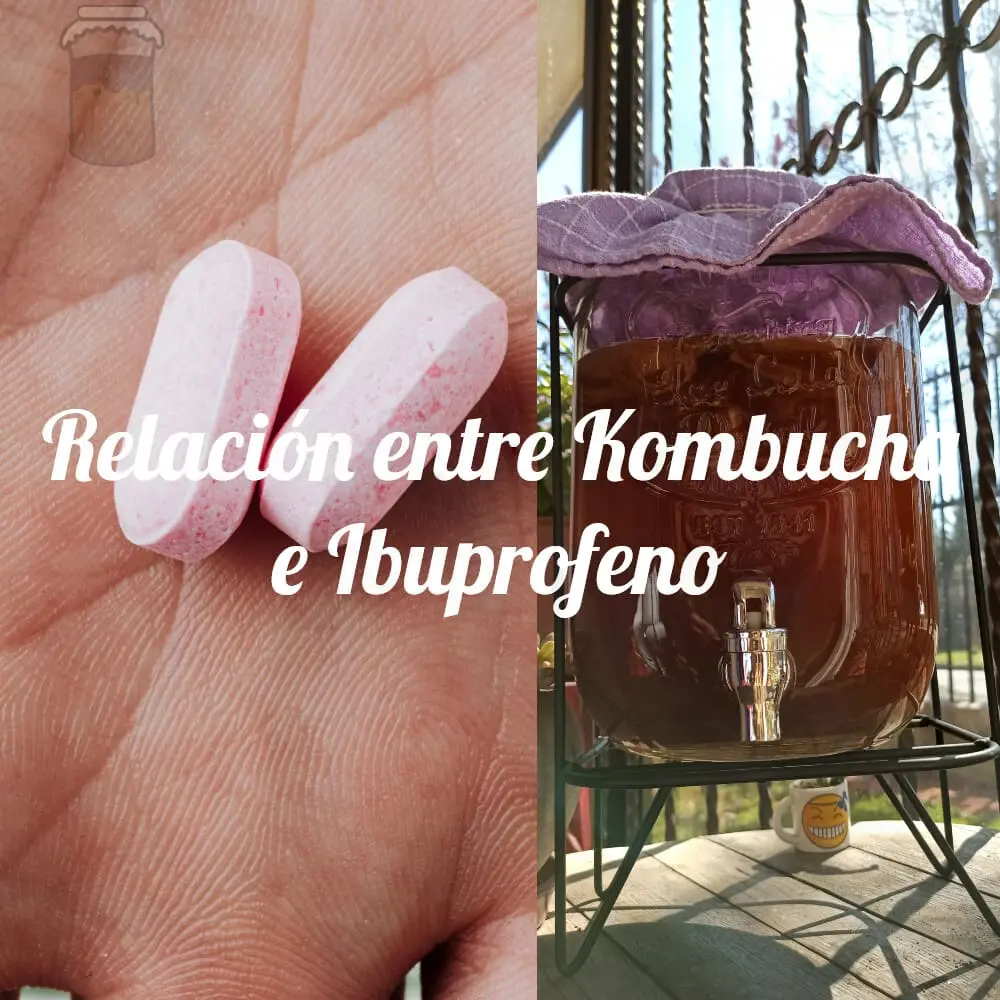Ibuprofen is a non-steroidal anti-inflammatory drug (NSAID) considered one of the safest in terms of side effects, but there are certain indications regarding its use with other substances, which pose a health risk if they interact with other components.
Kombucha tea has been described as containing a mixture of many substances including alcohol, glucuronic acid, acetic acid, heparin, and lactic acid, to name a few of the large number of elements that make up kombucha. [1]
Most of these components have been shown to be beneficial to health, but there are others that in high concentrations are harmful.
It is possible that the components of the drink can generate reactions with the drug that harm health, enhance its benefits or counteract its side effects such as the imbalance of the intestinal flora. [2]
Several studies performed on these components confirm certain interactions with the drug that could also manifest with the consumption of kombucha.
So the general recommendation, as we will break down each topic below, is not to consume kombucha together with ibuprofen, that is, you can consume both on the same day or in a short period of time, but not at the same time.
Contents
Can kombucha alcohol be dangerous with ibuprofen?
Alcohol taken in conjunction with ibuprofen has been shown to increase the risk of stomach or intestinal bleeding, including black stools, coughing, or vomiting blood. [3]
Apparently, this can only happen with the intake of high amounts of alcohol, so in moderate amounts it could be safe.
Nonsteroidal anti-inflammatory drugs (NSAIDs) such as aspirin and ibuprofen are associated with major upper gastrointestinal bleeding (HDA), being an important adverse effect of these drugs, and this condition worsens with the consumption of different amounts of alcohol, with the incidence of the disease being higher with high amounts in heavy drinkers. [4]
So that kombucha can not represent a risk you must make sure that it has a minimum amount of alcohol, less than 0.5% offered by this drink, in this way there will be no danger if you are medicating with ibuprofen. [5]
Even so, there are kombucha drinks that can contain beyond that amount, even if the product is finished and on sale, it can still ferment, so you can still produce more alcohol in the drink. There is also the brewing kombucha that for this case is totally contraindicated its consumption for exceedingly more than 5% of alcohol.
Liver damage from ethanol and ibuprofen consumption?
It is possible that very alcoholic kombucha with ibuprofen may increase the risk of liver toxicity, ibuprofen and ethanol-induced hepatotoxicity have been shown to exhibit synergistic action in alcoholic patients, further aggravating liver damage.
Inveterate users may have some liver damage due to ethanol toxicity, and it is possible that this condition predisposes to the appearance of hepatotoxicity at lower concentrations of ibuprofen, in addition it has been considered that oxidative stress is key to the development of hepatotoxicity so the use of antioxidants could be useful to prevent liver toxicity.
Kombucha contains many antioxidants that could help in this process, but only if you also find the minimum amounts of alcohol so as not to generate the opposite effect, even so, there is still a lack of studies that provide additional confirmation on the use of antioxidants as hepatotoxicity preventives, so it is not certain that it can help as a prophylaxis. [6]
What interaction can the caffeine in kombucha have with ibuprofen?
Caffeine might work as an analgesic adjuvant for the treatment of acute pain with ibuprofen, such as dental treatments or headaches. Although there are no studies that relate kombucha, it is possible that its caffeine content in variable amounts may generate some effect in interaction with ibuprofen. [7] [8]
One trial showed greater efficacy in combination of 400 mg of ibuprofen with 100 mg of caffeine for acute pain, compared to 400 mg of ibuprofen alone, 7 and together demonstrated significantly shorter times to relieve headache giving much greater total analgesia than either component alone. [8]
It has been considered that common sources of caffeine such as coffee, tea, energy drinks and pure chocolate can work, because if ibuprofen is combined with caffeine, it will be able to exert total analgesia with low doses. [9]
Kombucha tea could be taken into account, since its caffeine levels can affect the body without reaching adverse effects, so its interaction with ibuprofen is possible.
Can probiotics help prevent gastrointestinal damage from ibuprofen?
Probiotics could protect against enteropathy caused by NSAIDs, through the modulation of the intestinal microbiota, since the lesions caused by the drug are associated with the decrease of some intestinal bacteria necessary to maintain the integrity of intestinal tissues. [10]
NSAIDs can directly affect the composition and function of the gut microbiota or through altering physiological and structural functions such as the integrity of the mucosal barrier of the intestine by preventing the elimination of invading microbes and exacerbating the inflammatory response, maintaining the imbalance of the microbial flora. [11] [12]
From this, probiotic therapy was considered promising for the prevention of intestinal lesions induced by NSAIDs, being considered in supplementation or diets, even so, more studies are still needed to evaluate the clinical benefits that this therapy can offer. [10] [12]
Could the acidity of kombucha increase ibuprofen lesions?
It has been established in some studies that very acidic kombucha passed, beyond 10 days of fermentation, can rise to potentially harmful levels for consumption, since the acid content increases, and if the drink in these conditions is consumed with ibuprofen could increase the damage. [13] [14]
Similarly, the issue of 10 days is a number that I usually exceed at the time of fermentation, and I can verify that I have not had problems, nor anyone from the family environment that consumes it.
For its part, the abuse of NSAIDs can induce damage such as erosions and ulcers in the small intestine, these effects can be aggravated by certain components that increase acidity such as alcohol that stimulates the secretion of gastric acid, which together with a very acidic drink can impair the integrity of the gastrointestinal mucosa. [15]
But the reality is a little far from what was stated above, and is that one of the yeasts present in kombucha, the «Saccharomyces boulardii», offers some potential in the treatment and prevention of ulcers induced by NSAIDs, and this we deepen to a greater extent in the article on the effect of kombucha on gastric ulcers.
So the number of acids that kombucha can have been not an important factor as long as you do not mix both effects at the same time.
The recommendation has always been to consume this type of medication with water, and at the moment this should not change, if you then want to take your dose of kombucha is fine, but not at the same time.
This has been all for today, we invite you to continue reading more about all the benefits that kombucha can have in your body, but also that of other fermented ones.

